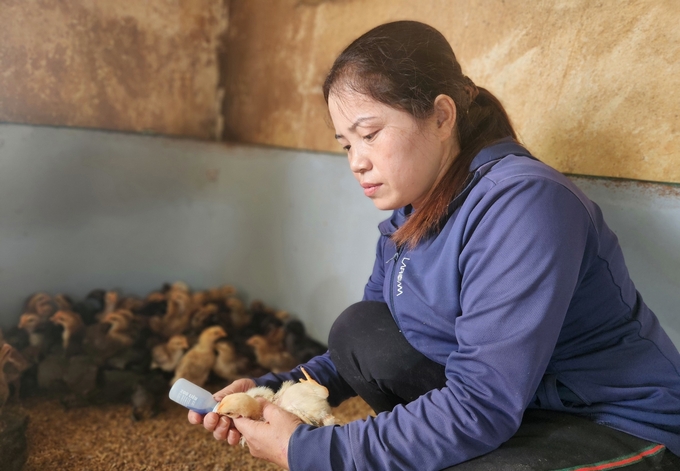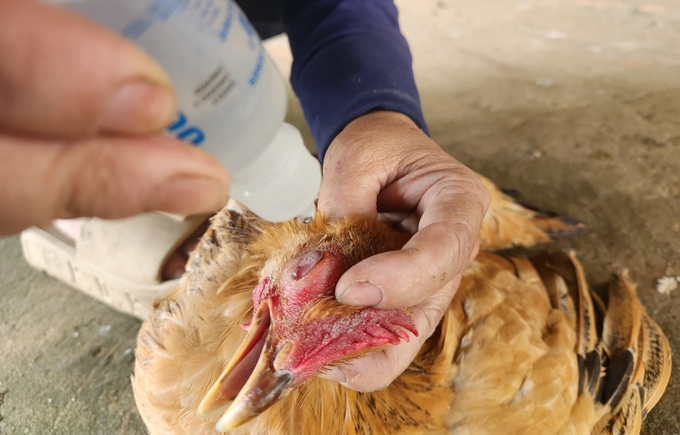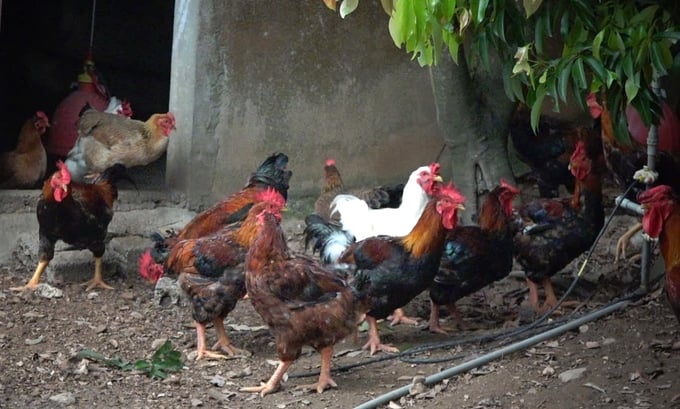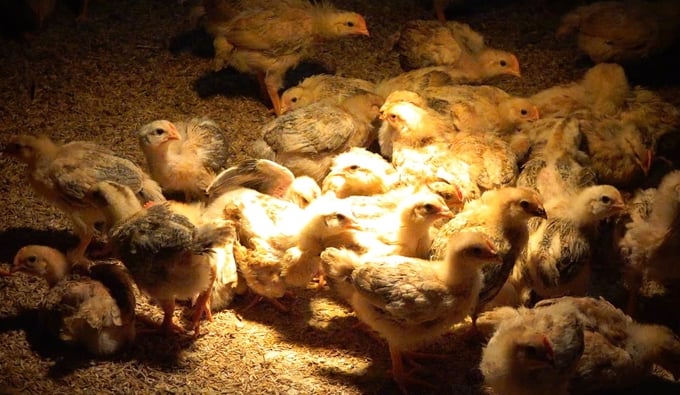June 18, 2025 | 09:34 GMT +7
June 18, 2025 | 09:34 GMT +7
Hotline: 0913.378.918
June 18, 2025 | 09:34 GMT +7
Hotline: 0913.378.918

Le Thi Thu proactively responds to disease outbreaks by strengthening protection for her chicken flock. Photo: Viet Khanh.
Nghe An province owns one of the biggest poultry herds in Vietnam, and the industry operates in unfavorable weather conditions, with lots of sun and rain, combined with a series of other external factors that cause animal diseases to always lurk. Considering the disease situation, farmers have flexibly responded by carrying out many different methods.
Le Thi Thu's family in Hung Tien Commune, Nam Dan District applies a mixed farm model, simultaneously raising pigs, geese, and chickens in large numbers, so they attach great importance to disease prevention. After more than a decade in the profession, Thu has gained valuable experience through blood and sweat.
“If we focus our efforts and capital on increasing the herd while neglecting disease prevention, we will fail miserably sooner or later. If we want our livestock to be healthy and have good resistance, we must proactively vaccinate them and get feed from reputable sources with clear origins. The next step is to disinfect the barns in order to create a clean and clear farm environment. Every step is important and must not be overlooked,” she said.

Using saline and vaccine to treat chicken eye worm. Photo: Viet Khanh.
Raising chickens for many years, Thu has noticed that diarrhea, bird flu, and blackhead (symptoms of neck retraction and loss of appetite) are quite common. Meanwhile, eye worm disease is rare but difficult to cure. This disease often occurs in winter in a high humidity environment. Infected chickens must be isolated immediately to avoid the disease spreading, and farmers should use saline to clean their eyes. The most effective solution is to use a special vaccine and inject it directly into the chicken wings.
The integrated farm model is well controlled in general, but Thu's family still proactively reduces the herd to make it easier to manage. For a long time, they have only maintained approximately 100 pigs and 1,000 chickens. After each batch, they will leave the barn empty for nearly a month to have time to disinfect and sterilize the cages.

Farm owners in Yen Thanh district are no longer interested in raising meat chickens as before. Photo: Viet Khanh.
Being flexible and adaptive to ensure harmony with reality is a must in the current context. This is even more evident in areas with large livestock and poultry herds such as Yen Thanh, Do Luong, Nam Dan, Dien Chau, etc.
“Yen Thanh possesses strengths in commercial poultry farming. Many farms used to raise broiler chickens, but now they have switched to raising chicks. The decision boasts its advantage by significantly shortening the raising time. Instead of dragging on for 4 - 5 months/batch, it now only takes 1-1.5 months for farmers to sell their products. This is also a prerequisite to help reduce the risk of disease,” said Nguyen Trong Huong, Director of the Agricultural Service Center of Yen Thanh district.

Raising chickens in a short period of time, saving costs and minimizing the risk of disease, is the preferred choice of the majority in Yen Thanh district. Photo: Viet Khanh.
Taking advantage of the hilly garden, Vo Thi Yen's family in Ma Thanh commune, Yen Thanh district has built a model of raising large numbers of broiler chickens, at its peak the farm maintained tens of thousands of chickens. Farming on a large scale means there are many potential dangers lurking, in fact there are times when epidemics spread and make the farm owner visibly suffer.
“No one can perfectly respond to the unpredictable epidemic. Although we have proactively taken action, there are times when we cannot react in time. I remember there was a time when the avian flu epidemic broke out on a large area, causing heavy economic damage to the family. It took us a long time to recover.
“Realizing that it was difficult to maintain such large herds, over the past two years, my family has switched to raising chicks. They can be sold after only 40 - 45 days. Shortening the raising time not only limits the risk of disease but also reduces the cost of feed and medicine, thereby stabilizing revenue,” Yen said.
Translated by Samuel Pham

(VAN) According to the Binh Thuan Department of Industry and Trade, in the first five months of 2025, Binh Thuan's dragon fruit export turnover increased by 20.65% compared to the same period last year.

(VAN) EU countries on Thursday gave final approval to new tariffs on fertilizer imports from Russia, a move aimed at cutting off revenue that could support Moscow’s war in Ukraine, despite concerns from European farmers.

(VAN) The working delegation from the Ministry of Agriculture and Environment conducted an important trip to the Netherlands to strengthen strategic partnerships and sustainable development in the agricultural sector.

(VAN) The letter ‘A Plea from the Ocean’ not only evokes emotion but also awakens the human conscience to the responsibility of protecting life on Earth.

(VAN) The Department of Agriculture in South Africa has announced the country’s first mass vaccination of poultry to prevent local birds from contracting avian influenza.

(VAN) Establishment of the Mekong Delta Regional Agricultural Linkage Center, aiming for a closed value chain, deep processing, trading platforms, and international market connectivity.

(VAN) Gia Lai province has recently recorded 460 rare species of animals and plants, contributing to forest conservation and biodiversity planning in the region.